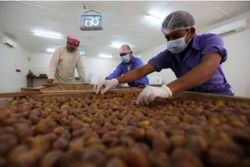
Last year, Al Dahra cultivated 150,000 hectares of freehold and leased land, producing more than 2 million tonnes of goods in 10 different countries. It already produces and exports rice from Pakistan, is the largest hay exporter in the United States and produces dates in Namibia. It also has a presence in Egypt, South Africa, Morocco, Australia, Spain and Serbia.
Key partner in UAE's food security strategy looks to Latin America
Tom Arnold
Al Dahra Agriculture, a private-sector partner of the UAE Government in securing key food staples, is targeting investments in coffee and sugar plantations in Latin America, said the company's vice chairman.
It follows the company buying stakes in recent weeks in Kohinoor Foods, one of India's biggest basmati rice producers, and Loulis Mills, the largest flour producer in Greece.
"We need to be in Latin America," said Khadim Al Darei, the vice chairman of Al Dahra. "We have trading there but need investment. We are looking at three countries: Brazil; Colombia; and Chile. We are thinking about coffee, this is a strategic item the UAE needs, and maybe sugar cane as we're building a sugar refinery in the UAE."
Al Dahra has invested more than US$1 billion in recent years as it has rapidly evolved from running a few farms in Abu Dhabi to becoming a multinational agribusiness with holdings across four continents and revenues of more than €500 million (Dh2.43bn). Its expansion has been given impetus by the increasing urgency of governments of the UAE and others in the region to safeguard supplies of essential food goods.
Last month, it was announced that Al Dahra was investing $18.8m for a 20 per cent stake in Kohinoor Foods. The deal involves developing and managing a facility in Abu Dhabi to produce up to 60,000 tonnes of white rice a year. The plan also involves building a separate storage facility of 30,000 tonnes by the end of next year.
"This will [help to] allow the UAE Government to have a strategic reserve of rice for maximum of six months," said Mr Al Darei. "This will be selling to GCC countries and elsewhere as it will be the biggest and first rice silo and factory in the region."
It comes less than two months after it emerged Al Dahra was buying a one-fifth stake in Loulis Mills, which has a 25 per cent market share of the Greek flour market.
The deal allows Al Dahra to export flour to the UAE and other Arab countries from Loulis' mills in Greece. Al Dahra will also use the expertise of Loulis Mills to establish flour mill complexes both in Fujairah and Abu Dhabi.
The UAE's reliance on food imports has risen to more than 90 per cent as a scarcity of water means it is unable to produce enough foods domestically for its fast-growing population. In response to a rapid rise in global food prices in 2007 and 2008, the UAE Government began targeting building up strategic reserves of commodities such as wheat, rice, flour, sugar and coffee to hedge against risks caused by fluctuation in prices or bad weather. A key step in that process has been the building in Fujairah of grain silos, capable of storing 275,000 tonnes of wheat and rice.
Al Dahra is one of several private-sector partners critical to the overall strategy. "Everything we do is built around food security," said Houssam Mahmoud, Al Dahra's chief executive.
"We want to be geographically diversified to guard against the risk of weather and currency movements."
Last year, Al Dahra cultivated 150,000 hectares of freehold and leased land, producing more than 2 million tonnes of goods in 10 different countries. It already produces and exports rice from Pakistan, is the largest hay exporter in the United States and produces dates in Namibia. It also has a presence in Egypt, South Africa, Morocco, Australia, Spain and Serbia.











